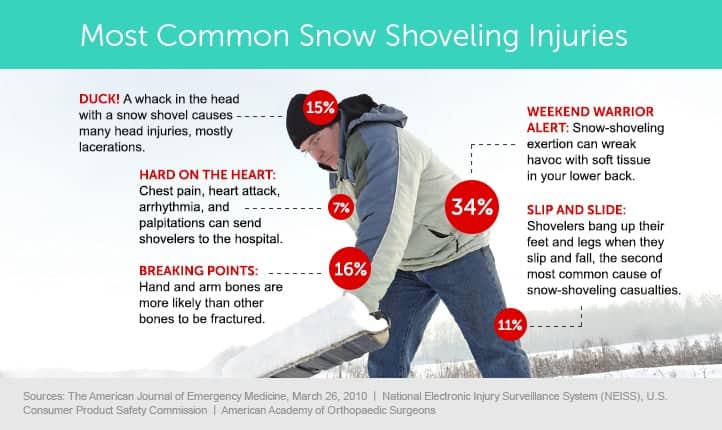Address
304 North Cardinal St.
Dorchester Center, MA 02124
Work Hours
Monday to Friday: 7AM - 7PM
Weekend: 10AM - 5PM
Address
304 North Cardinal St.
Dorchester Center, MA 02124
Work Hours
Monday to Friday: 7AM - 7PM
Weekend: 10AM - 5PM
The start of the winter season only means one thing; for most of us, it won’t be long before our driveways and sidewalks are covered in a fresh white blanket of snow. With it comes more than just cold temperatures, but the potential for serious injuries or death. Each year snow shoveling sends thousands of Americans to the hospital with injury or chest pain despite the often-repeated warnings of its dangers. Taking the steps to understand the risk as well as what you can do to protect yourself can make all the difference this winter season.
It is estimated that more than 11,000 people are injured every winter while shoveling their snow, and hundreds more suffer from heart-related issues and even death due to the physical strain that it puts on a person’s body.
For those who are at risk for a heart condition or even those who have not gotten much exercise in the months leading up to the snow season, it can be especially dangerous, as shoveling snow can routinely cause your heart to reach 75% of its maximum rate.
Along with that, the cold weather plays a factor as it can greatly increase the risks of heart attack or blood clot by causing blood pressure to rise in those who are exposed to it for any lengthy period of time.
While it is common to hear about people suffering heart attacks each year, far less talked about but just as common are those who suffer from non-heart related injuries.
Serious damage done to the can be caused by lifting heavy amounts of snow repeatedly or throwing using the wrong motion. The injuries that can be caused sometimes being serious enough to require surgery to repair.

Even those who do not do serious damage frequently experience shoulder, knee, or lower back pain for days following spending time shoveling. Also frequent are injuries to the head, as people are sometimes struck by their shovels after they lose control our slip and fall.
Start by preparing your body for exercise before you begin to shovel. No different than visiting the gym or playing a sport, you need to loosen your muscles up for them to operate at their best. Try doing some simple stretches before getting started in order to warm up.
Next, you should take breaks often. Many injuries are caused by people trying to keep pushing hard when their muscles are too tired to do so. Don’t be in a hurry, instead do a little bit at a time stopping to go inside and warm up. This will also help to regulate your blood pressure and reduce the risk of a blood clot as you are not being exposed to the cold for such long periods of time. If you experience any sort of chest pain or discomfort you should stop immediately and contact your doctor before starting again.
You should make sure that you are always wearing the proper protective gear when out in the elements. This means warm clothing, gloves, and non-slip boots, but can also mean a protective back or knee brace if you need it. Snow shoveling is very physically demanding, and making sure you have the proper equipment to handle the job will go a long way towards preventing injuries.
Again, make sure that you are using the proper shoveling techniques. Picking up shovelfuls of wet heavy snow and slinging it over your shoulder is a quick way towards lower back pain or a heart attack. Bend at the knees, moderate the amount you have in your shovel, and push it to the side closest to the area you are working on.
Finally, do a little at a time to avoid those extra heavy shovelfuls. Especially for large snowfalls, make a couple passes at clearing an area taking a layer off each time. This will put less strain on the body and give you a much better chance at avoiding serious injury.
If you are the victim of a snow shoveling injury, or if you want to take steps to prepare your body for the rigors of the winter you might consider seeking physiotherapy.
For treating exercise-related injuries physiotherapy can help condition the injured muscle, strengthening it and returning you to normal activity in a way that is non-invasive.
Physiotherapy can also be a tool for injury prevention, by helping you to keep your muscles and heart in a regular active routine, preparing them for the added strain that comes with shoveling.
Profusion Rehab is one of the leaders in physiotherapy located in Pickering and Milton, Ontario and they will help you get on the mend if you are injured this winter, or if you are concerned about getting injured.
They offer all kinds of rehab services designed to keep your body working at its top performance including physiotherapy, massage therapy, acupuncture, and more, and could be the call you need to make to stay safe this winter.